Gain insights into Abraham's genealogy in the Bible, where ancient roots reveal profound destinies and intertwining legacies.

Genealogy of Abraham in the Bible
Just as a tree's roots anchor it firmly, giving life to its branches and leaves, so does the genealogy of Abraham serve as the foundation for much of the biblical narrative. You'll find that tracing his lineage not only sheds light on the origins of the Israelites but also unveils the fulfillment of divine promises through generations.
From Abraham's early ancestors to the continuation of his legacy through Isaac and the sprawling branches formed by Jacob and the twelve tribes, there's a rich tapestry of stories and prophecies intertwined. But to truly appreciate the depth of Abraham's genealogical tree, you must explore the impact of his lineage, where faith and destiny converge in unexpected ways.
Key Takeaways
- Abraham's ancestry traces back to Terah, starting in Ur, setting a foundation for biblical narratives.
- The covenant with Abraham promises numerous descendants, land, and shapes religious community identity.
- Isaac and Jacob play crucial roles in fulfilling and expanding Abraham's legacy through their narratives.
- Abraham's lineage influences Judaism, Christianity, and Islam, emphasizing moral values and ethical conduct.
Abraham's Early Ancestry
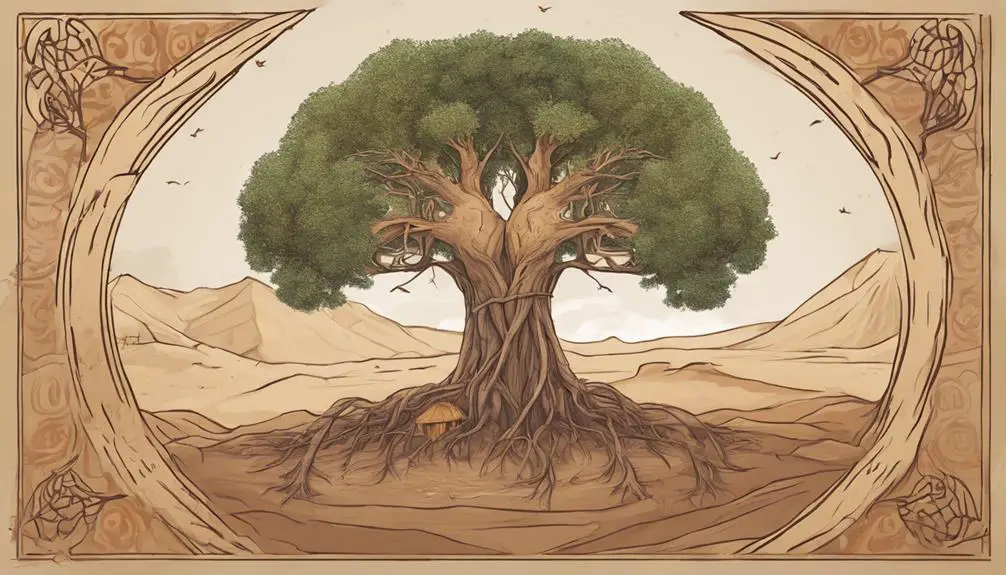
Tracing back Abraham's lineage reveals a complex web of familial connections, beginning with Terah, his father, and extending through a lineage that encapsulates significant figures in biblical history. Terah's journey, originating from Ur, a city of immense historical and cultural significance, sets the stage for understanding the roots from which Abraham emerged. Ur's significance can't be overstated; as a cradle of ancient civilization, it provided a backdrop rich in religious and cultural practices that likely influenced Abraham's early life and the narratives that followed.
Your exploration into Abraham's early ancestry wouldn't be complete without acknowledging the roles of his siblings and the wider family network. These relationships, while briefly mentioned, contribute to the tapestry of his lineage, offering insights into the familial dynamics at play. It's crucial to recognize that the genealogical records serve not just as a historical account but as a foundation for the narratives that unfold in biblical texts. They underscore the interconnectedness of figures pivotal to the development of monotheistic belief systems, rooting Abraham's story in a lineage that's both deeply human and divinely inspired.
The Promise to Abraham

Central to Abraham's narrative is the divine promise made to him, which marks a pivotal moment in biblical history and the development of monotheistic faiths. This promise encompasses not just a personal assurance to Abraham but holds profound covenant significance, shaping the contours of religious thought and community identity for generations.
The covenant, as laid out, promises Abraham numerous descendants, a relationship with the divine characterized by protection and blessing, and crucially, the gift of land inheritance. This land, later identified as Canaan, isn't merely a territorial grant but symbolizes a place of divine-human interaction and fulfillment of divine promises. The promise of land inheritance, therefore, goes beyond physical territory to signify a profound spiritual and communal inheritance, anchoring the identity of Abraham's descendants in a divinely sanctioned space.
This promise's multifaceted nature underscores its role as a foundational element in the formation of a people set apart. It's a cornerstone in the narrative of Abraham and his descendants, reflecting a divine strategy to establish a covenant people through whom the world would be blessed. The implications of this promise stretch far into the future, resonating through biblical history and beyond, underscoring its enduring significance.
Isaac: The Legacy Continues
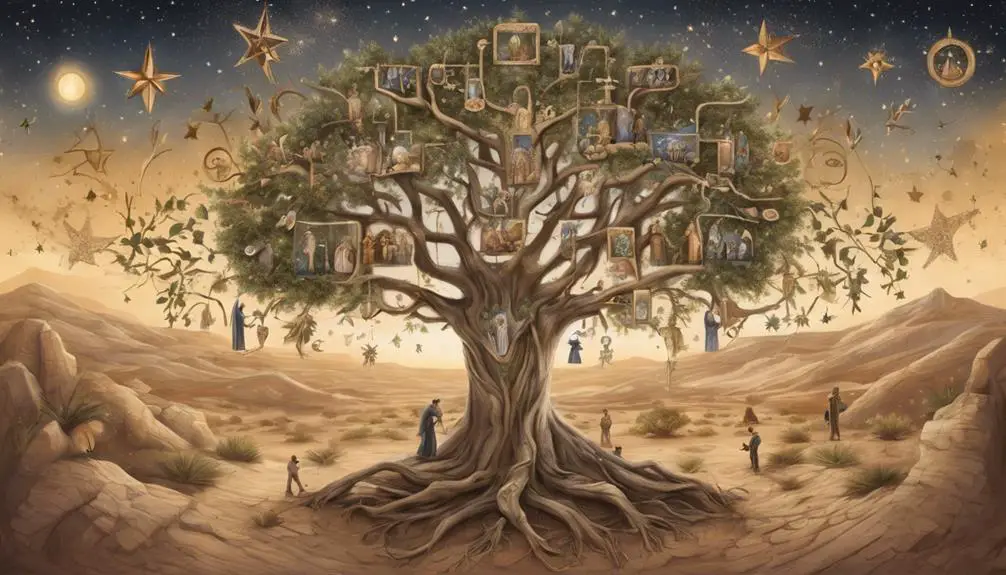
Building on the foundational promise made to Abraham, the legacy of this covenant finds its continuation and affirmation in the life and story of his son, Isaac. Central to Isaac's narrative is the profoundly significant event known as Isaac's Sacrifice. This episode not only tests Abraham's faith but also symbolically underscores Isaac's pivotal role in the divine plan, further cementing the covenantal promise through his survival and subsequent prosperity.
Equally critical to the perpetuation of this legacy is Rebekah's role. Her introduction into the narrative as Isaac's wife through a divinely guided selection process highlights the importance of matrimonial alliances in advancing God's promises. Rebekah's influence extends beyond her marital union; her actions and decisions directly impact the trajectory of the covenantal lineage. Through Rebekah, themes of providence and the active role of women in biblical genealogies are explored, offering a nuanced perspective on the continuation of the Abrahamic legacy.
Isaac's life, marked by both the divine trial of his near-sacrifice and his marriage to Rebekah, serves as a testament to the enduring nature of the covenant established with Abraham. Through these events, the narrative underscores the complexity and depth of the covenantal relationship, with Isaac's story embodying the fulfillment and perpetuation of his father's legacy.
Jacob and the Twelve Tribes
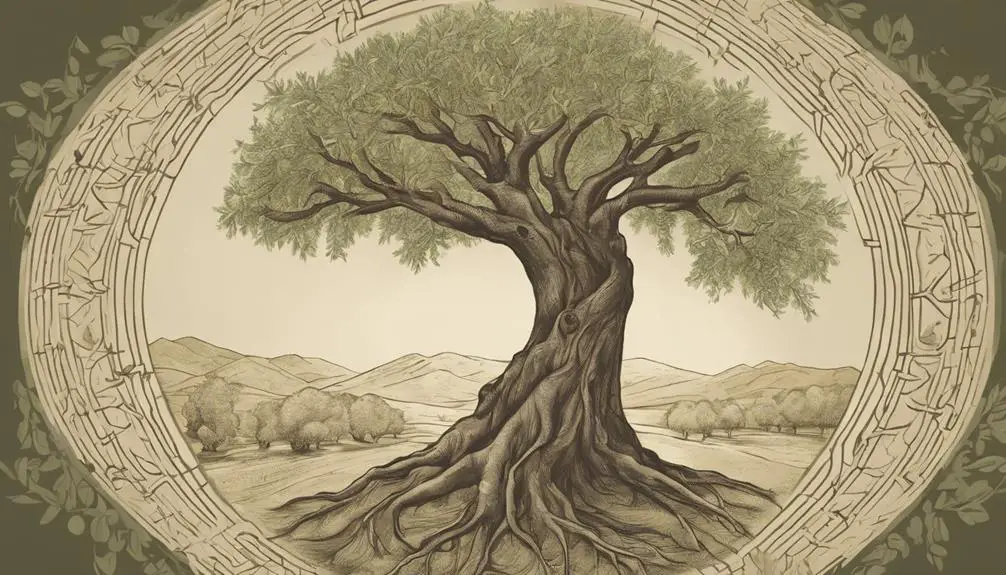
Jacob's story, pivotal in the biblical narrative, marks the transition from a single family covenant to the establishment of the Twelve Tribes of Israel, embodying the expansion of Abraham's legacy. His journey, from the acquisition of Esau's birthright to the dream of Jacob's ladder, sets the foundation for this transformation. You witness a character who, through divine encounters and strategic actions, not only secures his place in the covenant but also lays the groundwork for a nation.
The narrative of Jacob and Esau, beginning with Jacob's acquisition of the birthright, emphasizes strategic foresight and divine favor, themes that recur throughout the Torah. Jacob's ladder, a vision of angels ascending and descending, represents not only divine presence but also the connection between Heaven and Earth, further solidifying Jacob's role in the covenant.
Tribe |
Ancestor |
|---|---|
Reuben |
Leah |
Simeon |
Leah |
Levi |
Leah |
Judah |
Leah |
Dan |
Bilhah |
Naphtali |
Bilhah |
Gad |
Zilpah |
Asher |
Zilpah |
Issachar |
Leah |
Zebulun |
Leah |
Joseph |
Rachel |
Benjamin |
Rachel |
This table succinctly captures the origins of the Twelve Tribes, tracing back to Jacob's sons and their mothers, highlighting the polygamous and complex family structure that underpins Israel's twelve foundational tribes.
The Impact of Abraham's Lineage
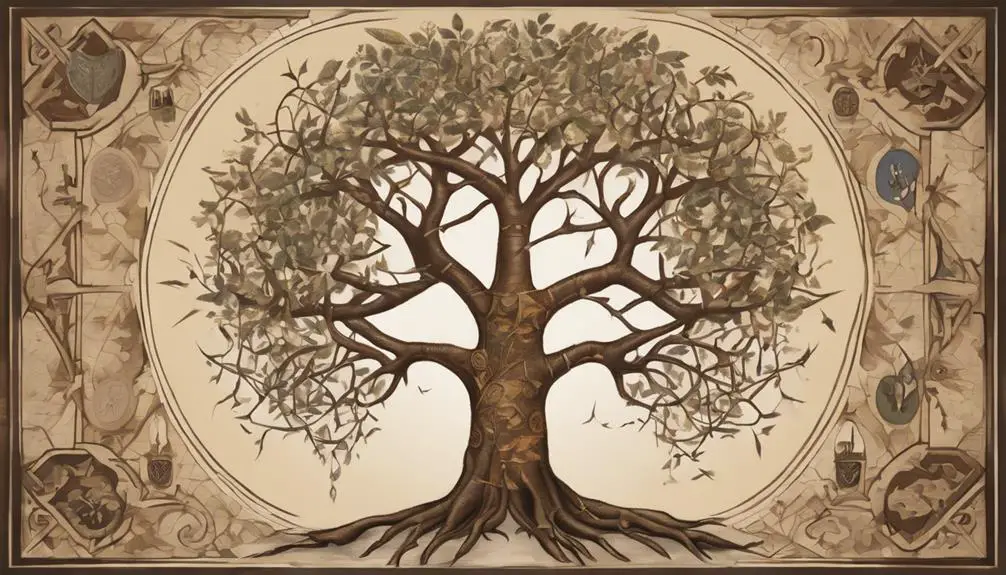
Abraham's lineage profoundly shaped the religious, social, and political landscapes of the ancient Near East, laying the foundational principles for monotheistic beliefs and nation-building. Descendants of Abraham, through his sons Isaac and Ishmael, played pivotal roles in the development and propagation of Judaism, Christianity, and Islam. These three major world religions, often referred to as the Abrahamic faiths, trace their origins back to Abraham, making his lineage central to a significant portion of the global population's spiritual heritage.
The impact of Abraham's lineage can be analyzed through several lenses:
- Interfaith Dialogues: Abraham's descendants fostered a rich tradition of interfaith engagement, serving as a bridge between diverse religious communities. This historical interconnectedness encourages contemporary efforts toward understanding and cooperation among Judaism, Christianity, and Islam.
- Ethical Implications: The narratives surrounding Abraham and his progeny emphasize moral and ethical conduct, influencing legal and social norms within these traditions.
- Nation-Building: Abraham's covenant with God, promising numerous descendants and land, has had lasting implications for national identity, particularly for the Jewish people, shaping political claims and conflict in the Middle East.
Understanding Abraham's lineage offers insights into the deeply intertwined nature of religion, ethics, and politics in human history.
Frequently Asked Questions
How Do Historical and Archaeological Findings Support or Contradict the Genealogy of Abraham as Described in the Bible?
When you delve into how historical and archaeological findings impact Abraham's origins, it's a mixed bag. Archaeological methodologies have both supported and challenged biblical narratives.
Some excavations and texts align with the biblical timeline and familial connections, suggesting a historical basis for these stories. However, other findings contradict or lack evidence for specific details, leading to debates among scholars.
Essentially, it's a complex interplay between faith, history, and science.
In What Ways Have Various Religious Traditions Outside of Judaism, Christianity, and Islam Interpreted or Altered the Genealogy of Abraham?
You'll find that various religious traditions have uniquely interpreted or altered Abraham's genealogy through myths and cultural adaptations. These traditions, stepping outside Judaism, Christianity, and Islam, often reimagine Abraham's legacy to fit their own spiritual narratives and cultural contexts.
Such reinterpretations aren't just mere alterations but are deeply rooted in the desire to connect with Abraham's storied past, showcasing the universal appeal and adaptability of his figure across different cultures and beliefs.
Are There Any Genetic Studies or DNA Evidence That Can Trace the Lineage of Modern Populations Back to Abraham or His Descendants?
You're looking into whether genetic methodologies or DNA evidence can trace lineage back to Abraham or his descendants.
While there's a significant interest in this area, it's fraught with DNA controversies. The challenge lies in the vast historical timeline and the mixing of populations over millennia.
No definitive genetic proof directly links modern populations to Abraham. Scholars and scientists approach these claims with skepticism, emphasizing the need for more concrete evidence and methodologies.
How Have the Interpretations of Abraham's Genealogy Evolved in Modern Theological Scholarship and What Implications Does This Have for Contemporary Faith Communities?
In modern theological scholarship, interpretations of Abraham's genealogy have shifted towards ethical and symbolic significance. This evolution reflects a nuanced understanding that goes beyond literal ancestry.
For contemporary faith communities, this means grappling with ethical lessons and symbolic meanings in these narratives instead of focusing solely on historical lineage. Such shifts have profound implications, encouraging a more inclusive and interpretive engagement with sacred texts.
What Role Does Abraham's Genealogy Play in the Broader Context of Middle Eastern History and the Formation of Early Human Societies?
You're exploring how cultural symbolism and interfaith dialogue are influenced by early narratives in Middle Eastern history, particularly through the lens of early human societies' formation.
Abraham's genealogy, though not explicitly mentioned, plays a pivotal role in understanding these dynamics. It serves as a foundational story, enriching your comprehension of how shared ancestries can foster deeper connections across diverse faith communities.
This contributes to a broader scholarly analysis of historical and cultural evolution.
Conclusion
In analyzing Abraham's lineage, you'll find that his descendants, especially through Isaac and Jacob, significantly shaped the historical and spiritual landscape of many cultures. The narrative of Abraham and his progeny isn't just a tale of familial succession; it's a complex interweaving of faith, promises, and pivotal moments that have profoundly influenced religious thought.
Your understanding of this genealogy underscores the enduring impact of Abraham's covenant with God, echoing through generations and highlighting the intertwined nature of faith and identity.


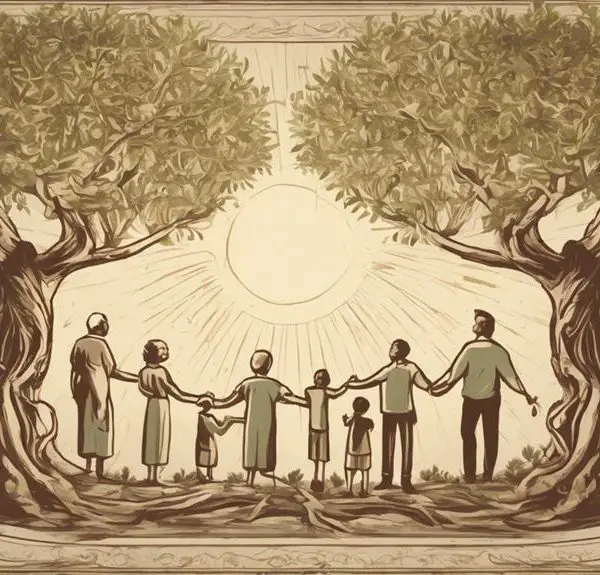
Sign up